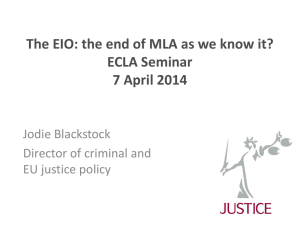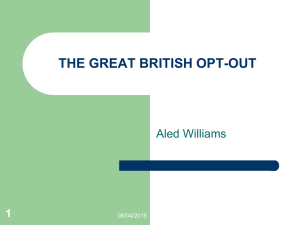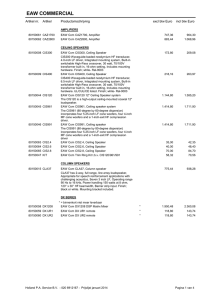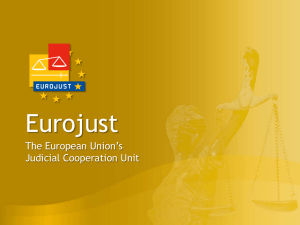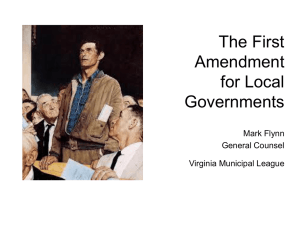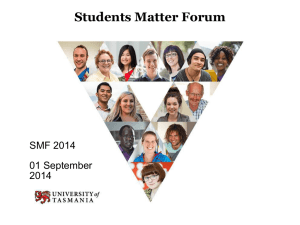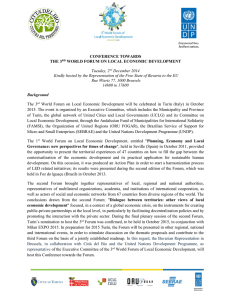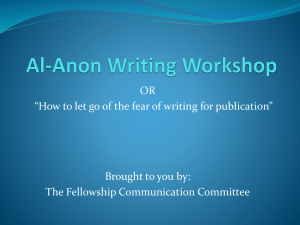Seminar on “The European Arrest Warrant: Which way forward?” 7th
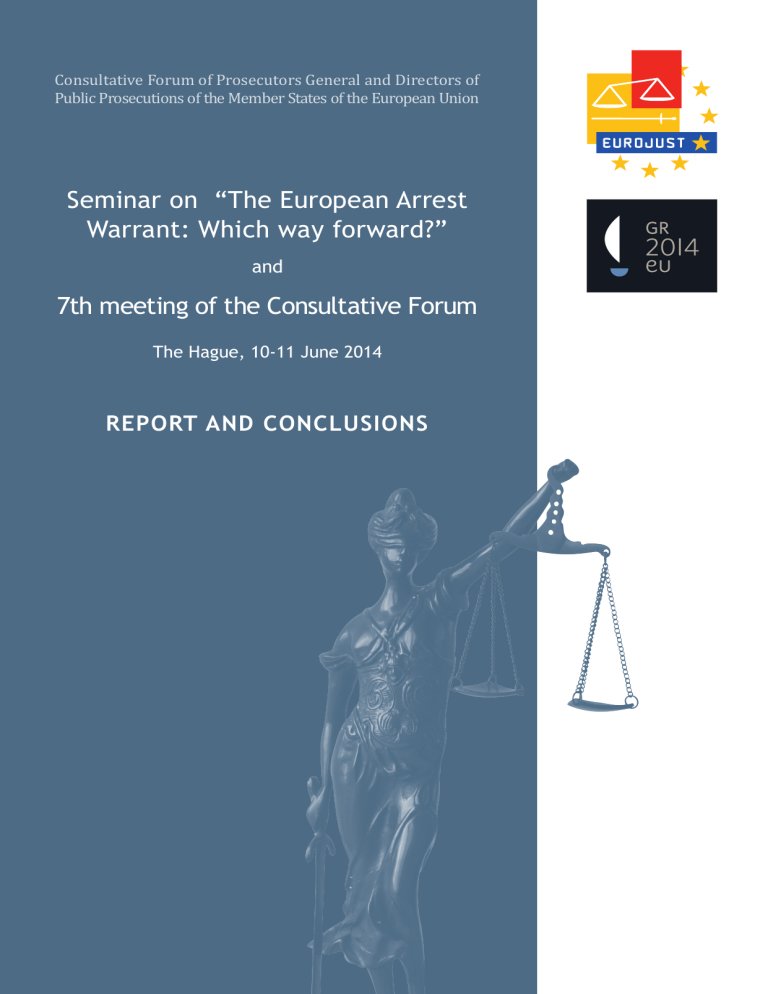
Consultative Forum of Prosecutors General and Directors of
Public Prosecutions of the Member States of the European Union
Seminar on “The European Arrest
Warrant: Which way forward?”
and
7th meeting of the Consultative Forum
The Hague, 10-11 June 2014
REPORT AND CONCLUSIONS
Consultative Forum of Prosecutors General and
Directors of Public Prosecutions of the Member States of the European Union
STRATEGIC SEMINAR ON
“T HE E UROPEAN A RREST W ARRANT : W HICH WAY FORWARD ?”
AND
7
TH MEETING OF THE
C
ONSULTATIVE
F
ORUM
OF P ROSECUTORS G ENERAL AND D IRECTORS OF P UBLIC P ROSECUTIONS
OF THE M EMBER S TATES OF THE E UROPEAN U NION
T
HE
H
AGUE
, 10-11 J
UNE
2014
R EPORT AND C ONCLUSIONS
Introduction
The Strategic Seminar “ The European Arrest Warrant: Which way forward?” , organised by
Eurojust in cooperation with the Hellenic Presidency of the EU, took place on 10 June 2014 in combination with the 7 th meeting of the Consultative Forum of Prosecutors General and
Directors of Public Prosecutions of the Member States of the European Union (Consultative
Forum or Forum) that was convened on 11 June 2014 by the Prosecutor General of Greece with the support of Eurojust. Participants from all Member States, EU institutions and Eurojust attended the combined event.
The goal of the Seminar was to encourage judicial practitioners to exchange views on problems and best practices associated with the operation of the European Arrest Warrant (EAW), also taking into account Eurojust’s role in facilitating the swift implementation and smooth operation of the EAW. On this basis, legal and practical solutions leading to improvements in the implementation of the EAW were identified, in particular in the four workshops devoted to specific topics.
The conclusions of the four workshops on the EAW were presented during the Consultative
Forum meeting on 11 June and served as the basis for further discussion by the Forum members. The Forum also discussed and reached conclusions on the fight against corruption and was presented with an update on relevant EU legislative developments regarding Article 10 of Protocol 36 to the Treaties, the draft Eurojust and European Public Prosecutor’s Office
(EPPO) Regulations and the draft Directive on the fight against fraud to the Union's financial interests (PIF Directive).
Strategic Seminar on the EAW (10 June)
The Strategic Seminar on 10 June was chaired by Michèle Coninsx (President of Eurojust and
National Member for Belgium) and opened by Nikolaos Ornerakis (Eurojust National Member for
Greece) .
The following keynote speakers intervened during the plenary session.
Final 05.09.2014
1 of 16
___________________________________________________________________________
Anne Weyembergh (Professor at Université Libre de Bruxelles (ULB)) presented the results of a recent study on the EAW that she had conducted for the European Parliament. She gave an overview of the different problems identified. On the one hand, she referred to problems related to the Framework Decision on the EAW (FD EAW) mechanism itself, e.g. concerning fundamental rights, legal remedies, maintaining SIS alerts following a refusal decision, multiple requests concerning the same person, transmissions of a translated EAW, information duties and accessory surrender. On the other hand, she highlighted problems related to the incompleteness and imbalances of the EU’s criminal justice area such as disproportionate EAWs, trial-readiness, compensation, defence rights and pre-trial detention. Subsequently, she suggested three types of EU action to address these problems: 1) practical tools such as training measures, the set-up of a specialised network of defence lawyers and the establishment of an EU database of relevant national case law on the EAW; 2) the need to revise the Handbook on How to Issue an EAW and to develop a “parallel” Handbook for defence lawyers; 3) further legislative action, including a horizontal EU instrument of general application to mutual recognition instruments with an explicit ground for refusal on fundamental rights, a reinforced consultation procedure between issuing and executing judicial authorities, a binding proportionality test and provisions on legal remedies and compensation.
Stavroula Koutoulakou ( Public Prosecutor and Hellenic Presidency representative) analysed the
EAW in the broader context of other relevant mutual recognition instruments. She indicated how the framework decisions on the Transfer of Prisoners, Probation and Alternative Sanctions and the European Supervision Order affect -or should affect- the functioning of the EAW. She also explained some of the ways in which the recently adopted Directive on the European
Investigation Order (EIO Directive) is expected to have a positive effect in the functioning of the
EAW. Finally, she mentioned several procedural rights instruments which also include links with the EAW. This EU criminal procedural law package was compared with a puzzle, where some pieces are missing and others do not fit very well. National judicial authorities face difficulties as they have to implement the sometimes fragmented and inconsistent EU legislation in a coherent and consistent way whilst at the same time ensuring compatibility with the legislation of other Member States. In this context, the support of Eurojust is crucial.
Olivier Tell (Head of Procedural Criminal Law Unit, Directorate-General for Justice, European
Commission) presented the Commission’s perspective in the context of reflections on the EAW.
The Commission wishes to consolidate and improve the EAW. As of 1 December 2014, current limitations to the judicial control by the European Court of Justice and the Commission’s power to initiate infringement proceedings will be lifted, and it will be possible in some Member States to make preliminary references to the European Court of Justice for the first time. These preliminary references are fundamental to EAW work. The mutual recognition package, including the recently adopted EIO Directive, should be seen as coherent and complementary, and the implementation of existing framework decisions is pivotal for the successful use of the
EAW. Eurojust’s role in assisting practitioners in concrete EAW cases was emphasized.
Michèle Coninsx , together with Pietro Suchan (Assistant to the Eurojust National Member for Italy and Chair of the Eurojust Judicial Cooperation Instruments Team) presented the role and experience of Eurojust in the field of the EAW. Eurojust dealt with 1730 EAW cases between
STRATEGIC SEMINAR ON
R EPORT AND C ONCLUSIONS
“T HE EAW: WHICH WAY FORWARD ?” AND 7
TH
M EETING OF THE C ONSULTATIVE F ORUM OF P ROSECUTORS G ENERAL
AND D IRECTORS OF P UBLIC P ROSECUTIONS OF THE M EMBER S TATES OF THE E UROPEAN U NION
(T HE H AGUE , 10-11 J UNE 2014)
Final 05.09.2014
2 of 16
___________________________________________________________________________
2007 and 2013. Eurojust plays a key role in facilitating the execution of EAWs and the exchange of information; clarifying legal requirements; advising on drafting EAWs; advising on the priority to be given to competing EAWs; reporting on breaches of time limits in the execution of
EAWs and the reasons for these; coordinating the execution of EAWs and contributing to the prevention of ne bis in idem issues and conflicts of jurisdiction; generally speeding up the execution of EAWs. On the basis of its casework, Eurojust also identifies issues, difficulties and best practices in the operation of the EAW, and has developed guidelines and collated EAW related case law with a view to assisting practitioners.
In the afternoon, four workshops were held in parallel on specific issues relating to the operation of the EAW. Participants exchanged views on the basis of a discussion paper circulated in advance. The conclusions of the workshops were presented during the meeting of the Consultative Forum which took place on the following day ( see below).
Meeting of the Consultative Forum (11 June)
The 7 th meeting of the Consultative Forum on 11 June was opened by Michèle Coninsx and chaired by Efterpi Koutzamani (Prosecutor General of Greece) . Tomas Krušna (Deputy Chief
Prosecutor, Office of the Prosecutor General of Lithuania) , on behalf of the Prosecutor General of
Lithuania, gave an overview of the activities of the Forum under the Lithuanian Presidency
(July-December 2013).
Session I – The European Arrest Warrant: Perspectives and Proposals
The first session was devoted to continuing the discussions of the Strategic Seminar on the practical operation of the EAW, particularly with a view to reflecting on the legal and practical solutions that could further improve its implementation and functioning.
Firstly, the conclusions of the four workshops held on 10 June were presented by the respective rapporteurs. They can be summarised as follows.
Workshop I: Scope and content of the FD EAW
Chair: Francisco Jiménez Villarejo (Vice-President of Eurojust and National Member for Spain)
Rapporteur: Ola Löfgren (Head of International Unit, Office of the Prosecutor General, Sweden)
The discussions within the workshop touched upon four main areas: i ) choice of the adequate instrument; ii ) proportionality of EAWs; iii ) information to be provided in the course of EAW proceedings; and iv) dual criminality. i) With regard to the choice of the adequate instrument and the interaction between the FD
EAW and other mutual legal assistance (MLA) and mutual recognition (MR) instruments, workshop participants discussed and concluded that:
The FD EAW can be linked to a number of other MR instruments, but not all of them are true alternatives. The FD on the Transfer of Prisoners can be an alternative if there are
STRATEGIC SEMINAR ON
R EPORT AND C ONCLUSIONS
“T HE EAW: WHICH WAY FORWARD ?” AND 7
TH
M EETING OF THE C ONSULTATIVE F ORUM OF P ROSECUTORS G ENERAL
AND D IRECTORS OF P UBLIC P ROSECUTIONS OF THE M EMBER S TATES OF THE E UROPEAN U NION
(T HE H AGUE , 10-11 J UNE 2014)
Final 05.09.2014
3 of 16
___________________________________________________________________________ re-socialisation arguments and if the case concerns the execution of a sentence. The FD on the European Supervision Order can be an alternative too, but its scope is limited as it is not suitable for serious offences. The FD on Probation and Alternative Sanctions is not a real alternative and practitioners have very little experience with this instrument.
The EIO Directive is not a real alternative either, because the EAW and the EIO concern two different phases in criminal proceedings (prosecution/ investigation versus mere interrogation).
Difficulties in the choice of the instrument are due to: a lack of implementation of these instruments; a lack of knowledge; and a lack of tools and guidance for practitioners.
Eurojust plays a crucial role in supporting national authorities in their choice and in providing them with information (e.g. on the national law of other Member States).
Possible solutions include a more stringent implementation policy in the Member States as well as the development of soft law measures and practical tools, e.g. training, handbooks, and databases of European and national case law to support national authorities. ii) With regard to the proportional use of EAWs and the roles of the issuing and executing authorities, workshop participants in the discussed and concluded that:
Disproportionate EAWs may be those relating to: “minor” offences; EAWs issued for the sole purpose of interrogation; and EAWs where the issue of proportionality is linked to humanitarian concerns.
Disproportionate use of EAWs is limited to a relatively small number of Member States and there is a clear decrease of such use.
The starting point is and should be the prominent role of the issuing judicial authority, but consultation procedures between issuing and executing authorities can be useful.
As a “best practice” can be mentioned an executing authority’s initiative to propose to the requested person to simply pay the very low fine for which his surrender was asked.
Eurojust plays an important role in stimulating and facilitating consultations, in particular in serious cross-border cases, and its experience and case by case approach is very helpful.
Recent national examples show that proportionality issues can be tackled most effectively at national level. Additionally, at EU level, the development of soft law measures (e.g. handbooks) and practical tools (e.g. training) are considered useful. iii) With regard to the information to be provided in the course of EAW proceedings, workshop participants discussed and concluded that:
Neither a maximalist nor a minimalist approach to the requested information is optimal.
Consultation procedures in the context of Article 15(2) FD EAW are an often disregarded problem: these can be useful, but also have a great impact in terms of delay.
The quality of the language/translation of the information provided is often problematic. Eurojust plays an important role in checking and helping with
STRATEGIC SEMINAR ON
R EPORT AND C ONCLUSIONS
“T HE EAW: WHICH WAY FORWARD ?” AND 7
TH
M EETING OF THE C ONSULTATIVE F ORUM OF P ROSECUTORS G ENERAL
AND D IRECTORS OF P UBLIC P ROSECUTIONS OF THE M EMBER S TATES OF THE E UROPEAN U NION
(T HE H AGUE , 10-11 J UNE 2014)
Final 05.09.2014
4 of 16
___________________________________________________________________________ translations. Eurojust also facilitates contacts between judicial authorities which is particularly valuable in urgent cases.
The provision on temporary surrender is useful, but its practical implementation is considered cumbersome and therefore should be developed further.
Possible solutions could include the development of guidelines on the scope of Article
15(2) FD EAW and the choice of a vehicular language to address translation problems. iv) With regard to the issue of dual criminality, workshop participants discussed and concluded that:
The often criticised broad nature of the so-called list offences, together with the issuing authority’s exclusive role in determining the legal classification of an offence, is one of the reasons for the EAW’s success and efficiency.
Issuing authorities’ exclusive role implies that executing authorities can only intervene in case of an obvious, formal error, in which case they must consult with the issuing authority (no “blind” executions).
Executing judicial authorities must respect the legislative choices made by the issuing
Member State’s legislator, for example on sensitive issues such as terrorism. The latter has, in principle, full discretion to define offences in its national criminal law. Yet it was argued by some that the EU Charter can constitute - in extreme cases - a limit to this power.
Workshop 2: Grounds for Non-Recognition and Guarantees
Chair: Donatella Frendo Dimech (Eurojust National Member for Malta)
Rapporteur: Ignazio Patrone (Deputy Prosecutor General at the Italian Supreme Court and
Coordinator of International Affairs Department)
The discussions within the workshop were enriched by references to the case law of the
European Court of Justice (CJEU) and by the practical case examples reported by the participants which touched on three main areas: i) Protection of fundamental rights; ii) surrender of nationals, residents and persons staying in the territory; and iii) trials in absentia . i) With regard to the different issues related to the protection of fundamental rights in EAW proceedings, workshop participants discussed and concluded that:
The EAW remains a pivotal instrument and the principle of mutual recognition remains of paramount importance for the operation of the EAW, especially in the context of the protection of fundamental rights. Mutual recognition depends entirely on mutual trust between judicial authorities and in each other’s judicial systems.
However, mutual trust does not mean “blind” trust. In this regard, Articles 1(3) and
Recital 12 FD EAW on the respect of fundamental rights already provide a legal basis for effective protection by competent national courts.
While several Member States introduced an explicit ground for refusal on fundamental rights in their national implementation law on the EAW, others rely on general
STRATEGIC SEMINAR ON
R EPORT AND C ONCLUSIONS
“T HE EAW: WHICH WAY FORWARD ?” AND 7
TH
M EETING OF THE C ONSULTATIVE F ORUM OF P ROSECUTORS G ENERAL
AND D IRECTORS OF P UBLIC P ROSECUTIONS OF THE M EMBER S TATES OF THE E UROPEAN U NION
(T HE H AGUE , 10-11 J UNE 2014)
Final 05.09.2014
5 of 16
___________________________________________________________________________ constitutional safeguards, including the European Convention on Human Rights and the
Charter of Fundamental Rights of the EU.
In practice, experience shows that in only a few cases has the execution of a EAW been refused on the basis of allegations of breach of fundamental rights. This means that the arguments to support such allegations must be seriously grounded.
Examples mentioned indicate that recent fundamental rights’ concerns mainly relate to prison conditions and the length of the pre-trial detention. The question of the proportionality of issuing EAWs in trivial cases is also linked to the respect of fundamental rights.
In any case, negotiations on the current FD EAW should not be reopened.
The added-value of including a ground for refusal on fundamental rights in the EIO
Directive will need to be evaluated in practice once it enters into force. The idea of a single horizontal instrument, common to all MR instruments and including an explicit ground for refusal on fundamental rights, was partially supported.
Mutual consultations between the issuing and executing judicial authorities greatly help to clarify possible concerns and should be promoted and encouraged.
Where involved, Eurojust has proved to be pivotal for providing coordination and a real time channel of communication and for facilitating mutual understanding. In addition to this, Eurojust could further: o Provide up to date information on problems and offering possible solutions to national authorities; o Develop a database of domestic and European case law and case summaries; o Contribute to making the Handbook on How to Issue an EAW more
“practitioner-oriented”. ii) With regard to the surrender of nationals, residents and persons staying in the territory, workshop participants discussed and concluded that:
There are divergent rules in the Member States in relation to this matter and Articles
4(6) and 5(3) FD EAW are applied differently. If on the one hand, there are difficulties in finding a common definition of “residents” and “persons staying in the executing
Member State”, on the other hand, case law from the CJEU and the European Court of
Human Rights (ECtHR) are important sources of reference.
General guidelines for the application of the rules in this matter are preferable to a caseby-case approach. A handbook for practitioners would be certainly helpful.
FD 2008/909/JHA on the Transfer of Prisoners is meant to facilitate the transfer of custodial sentences on the basis of the mutual recognition principle and therefore should also help to overcome shortcomings in the application of the EAW. However, it has not yet been implemented in all Member States. iii) With regard to the new legal regime on trials in absentia , workshop participants discussed and concluded that:
Only a few Member States have transposed the FD 2009/299/JHA on decisions rendered in absentia , even though the deadline for transposition expired on 28 March 2011. This
STRATEGIC SEMINAR ON
R EPORT AND C ONCLUSIONS
“T HE EAW: WHICH WAY FORWARD ?” AND 7
TH
M EETING OF THE C ONSULTATIVE F ORUM OF P ROSECUTORS G ENERAL
AND D IRECTORS OF P UBLIC P ROSECUTIONS OF THE M EMBER S TATES OF THE E UROPEAN U NION
(T HE H AGUE , 10-11 J UNE 2014)
Final 05.09.2014
6 of 16
___________________________________________________________________________ means that we are currently in a “transitional period” where the old and new regimes coexist and it is difficult to assess the changes brought by the new legislation.
However, during this transitional period, a number of problems have been encountered by the judicial authorities in the use of the new/old form and in relation to the additional information needed as a consequence.
The added value of the FD on decisions rendered in absentia should be (re-)assessed once it has been transposed in at least a majority of Member States.
Workshop 3: Surrender Procedure
Chair: Michael Rothärmel (Seconded National Expert to the Eurojust National Member for
Germany)
Rapporteur: Peter Mullan (Chief Prosecution Solicitor, Office of the Director of Public
Prosecutions, Ireland)
The discussions within the workshop touched upon three main areas: i ) concurrent or conflicting EAWs, ii ) delays in the execution of EAWs and breaches of time limits; and iii ) transmission of EAWs. i) With regard to issues arising from concurrent or conflicting EAWs, and bearing in mind the role of Eurojust under Article 16(2) FD EAW, workshop participants discussed and concluded that:
Issues encountered in this field should be better tackled by way of soft law, such as by way of amendments to the Handbook on How to Issue an EAW, rather than by way of legislative changes.
An automatic alert from SIS in case of existence of a second EAW against the same person should be technically possible to allow the earliest possible awareness of concurrent EAWs.
This early awareness of the existence of concurrent EAWs should allow early dialogue between the issuing authorities concerned, notably by means of a coordination meeting at Eurojust to agree on a common strategy in advance of an arrest being made with a view to preventing possible difficulties. This agreement could always be revised if further concurrent EAWs were to come to light.
The Handbook on How to Issue an EAW should be amended so as to include: i ) a recommendation that such agreements relating to concurrent EAWs reached between issuing authorities are taken into consideration by the executing authority, especially those reached at coordination meetings at Eurojust); ii ) a recommendation to complete section “f” (other circumstances relevant to the case) of the EAW form regarding these agreements, so that executing authorities are immediately aware of them; and iii ) the
Eurojust Guidelines for Deciding on Competing EAWs (2004) with a view to refining the criteria that can be taken into account by the executing authority in reaching decisions under Article 16(1) FD EAW.
STRATEGIC SEMINAR ON
R EPORT AND C ONCLUSIONS
“T HE EAW: WHICH WAY FORWARD ?” AND 7
TH
M EETING OF THE C ONSULTATIVE F ORUM OF P ROSECUTORS G ENERAL
AND D IRECTORS OF P UBLIC P ROSECUTIONS OF THE M EMBER S TATES OF THE E UROPEAN U NION
(T HE H AGUE , 10-11 J UNE 2014)
Final 05.09.2014
7 of 16
___________________________________________________________________________ ii) With regard to the matter of delays in the execution of EAWs and breaches of time limits, workshop participants discussed and concluded that:
Member States should be encouraged to comply with their obligation towards Eurojust under Article 17(7) FD EAW to allow Eurojust, on the basis of its casework and on the information received on the reasons for the delays, to make informed recommendations about time limits delays in the Member States and how to address them.
The importance of increasing training in EAW matters with a view to having specialised prosecutors in this field, which could contribute to reduce some delays in the execution of EAWs.
The importance of defence lawyers specialised in EAW matters being involved at an early stage so that they can give informed advice to clients from the outset, which may reduce some delays in the execution of EAWs. iii) With regard to issues arising from the transmission of EAWs, namely linked with the different national time limits for the transmission of the original EAW or its translation, workshop participants in the discussed and concluded that:
The quick submission of the translated EAWs after arrest has an impact on the surrender procedure as a result of tight deadlines imposed under some national legislations.
The possibilities of setting up a dedicated translation unit for these purposes at EU level, which would be available to issuing authorities 24/7 should be explored. These translators would be specialised in these matters and available mostly in urgent cases.
Participants noted that the issue of poor quality translations of EAWs and insufficient translation resources at national level were highlighted during the 6 th Round of Mutual
Evaluations.
Workshop 4: Effects of the surrender
Chair: Ladislav Hamran (Vice-President of Eurojust and National Member for Slovak Republic)
Rapporteur: Beata Hlawacz (Deputy Director, Department of International Cooperation, Office of the Prosecutor General, Poland)
The discussions within the workshop were based on Eurojust cases and other cases reported by practitioners and touched upon four main areas: i ) speciality rule; ii ) compensation; iii ) regular review and update of SIS II; and iv ) surrender or subsequent extradition.
In general, workshop participants concluded that:
Eurojust could contribute to the regular update of the Handbook on How to Issue an
EAW and to making it more “practitioner friendly”.
Eurojust could enhance its role as centre of legal and practical expertise in the field of the EAW, given its unique composition of experienced prosecutors and judges from the
28 Member States supported by European specialised staff. It should: o systematically collect and analyse cases referred to Eurojust and, as a result, provide feedback to practitioners;
STRATEGIC SEMINAR ON
R EPORT AND C ONCLUSIONS
“T HE EAW: WHICH WAY FORWARD ?” AND 7
TH
M EETING OF THE C ONSULTATIVE F ORUM OF P ROSECUTORS G ENERAL
AND D IRECTORS OF P UBLIC P ROSECUTIONS OF THE M EMBER S TATES OF THE E UROPEAN U NION
(T HE H AGUE , 10-11 J UNE 2014)
Final 05.09.2014
8 of 16
___________________________________________________________________________ o gather information on legal issues, practical difficulties and best practices with the aim of offering solutions; o collect information on the implementation of EU instruments; o provide useful information on case law, e.g. the Eurojust overview of European and Constitutional case law in relation to the EAW. i) With regard to issues arising from the speciality rule, several cases were reported. workshop participants discussed and concluded that:
In an ideal world where the FD EAW had been implemented in the same way in all
Member States, the speciality rule would not be needed.
From the practitioner’s point of view, abolition of the speciality rule would certainly help. At the same time, some expressed concerns about a possible misuse of the EAW should this rule be abolished.
Keeping the speciality rule, which was considered to be in contradiction with the principle of mutual recognition and mutual trust, remains a political decision. ii) With regard to compensation, several cases of unjustified arrests were reported. Workshop participants discussed and concluded that:
There are divergent rules in the Member States in relation to this matter.
Uniform EU rules establishing a compensation scheme are needed. The compensation scheme should cover, inter alia , the immediate right to claim compensation for citizens who suffered damage; subsequently, a mechanism to sort out disputes on compensation between Member States, including arbitration; address the issue of last minute cancellations of planned handovers. iii) With regard to the issue of the regular review and update of SIS II alerts, workshop participants discussed and concluded that:
A mechanism to alert prosecutors/competent authorities to review SIS II alerts when needed would be desirable.
Review periods differ in Member States.
Shorter review periods than those provided for in Article 44 of Council Decision
2007/533/JHA of 12 June 2007 on the establishment, operation and use of SIS II would be welcome.
SIS II alerts should include information on the reasons for previous refusals, e.g. in cases of ne bis in idem.
Based on the practitioner’s point of view, the principle of mutual recognition should not be applied to refusal decisions. iv) With regard to issues arising from surrender or subsequent extradition, workshop participants discussed and concluded that:
No consent should be needed for subsequent surrender between EU Member States in view of the principle of mutual trust and confidence.
STRATEGIC SEMINAR ON
R EPORT AND C ONCLUSIONS
“T HE EAW: WHICH WAY FORWARD ?” AND 7
TH
M EETING OF THE C ONSULTATIVE F ORUM OF P ROSECUTORS G ENERAL
AND D IRECTORS OF P UBLIC P ROSECUTIONS OF THE M EMBER S TATES OF THE E UROPEAN U NION
(T HE H AGUE , 10-11 J UNE 2014)
Final 05.09.2014
9 of 16
___________________________________________________________________________
In relation to third States, taking into account concerns raised by practitioners, it was agreed that consent for subsequent extradition should be required.
Following the presentations by the rapporteurs of the workshops, some introductory speeches were made.
Lars Bay Larsen ( Judge at the Court of Justice of the European Union ) gave his personal views on the relevant case law of the CJEU. He first discussed the Advocaten voor de Wereld and Mantello judgments to highlight the important issues of mutual trust and control by the issuing judicial authority in the EAW context. He then addressed the role of executing judicial authorities in cases where fundamental rights issues are at stake. He referred to the main lesson learnt from the N.S. & M.E.
judgment on asylum matters, namely that “executing authorities should not turn a blind eye to situations where systematic problems are at hand”, which is relevant to other parts of freedom, security and justice policy too. Next, he commented on the constructive ambiguity created by the legislator in Articles 4(6) and 5(3) FD EAW. Even though Kozlowski ,
Wolzenburg and Lopes de Silva Jorges have clarified - on a case by case basis - some specific issues, many questions remain open. Finally, two recent ne bis in idem judgments were mentioned. These judgments do not only give some useful clarification on the meaning of “final judgment” ( M ) and “the enforcement condition” ( Spasic ), but they also reveal that -despite so many EU cooperation tools- there is still room for improvement in the EU criminal justice area.
Baroness Sarah Ludford (Member of the European Parliament until July 2014) presented the
European Parliament’s views on the future of the EAW. The best long-term strategy is reform at
EU level to ensure the proper functioning of the EAW and guarantee effective and efficient justice. The European Parliament’s recent report on the review of the EAW, for which Baroness
Ludford was the rapporteur, calls on the Commission to come forward with legislative solutions in relation to the EAW within one year. The report calls, inter alia , for a proportionality check to be carried out in the issuing Member State; a consultation procedure between issuing and executing Member States; a timely and effective implementation of the whole body of Union criminal justice measures; a mandatory ground for refusal on fundamental rights; effective legal remedies available to individuals and Member States; and the strengthening of contact networks of judges, prosecutors and criminal defence lawyers. The importance of Eurojust’s role in improving the effectiveness of investigations and prosecutions and in facilitating coordination and cooperation was noted.
Michèle Coninsx presented some considerations on the EAW from Eurojust’s perspective in light of the conclusions of the workshops and interventions. At this stage, the problems identified in relation to the EAW would be better tackled by way of soft law measures rather than by legislative changes and all means available at European and national level should be explored in this regard. Eurojust can contribute to a smoother operation of the EAW as it has a pivotal role in: i ) facilitating judicial authorities’ understanding of each other’s legal systems; stimulating and understanding consultation; coordinating; and assisting with the translation of EAWs; ii ) enhancing its position as a centre of legal and practical expertise in the field of EAW given its unique composition of experienced prosecutors and judges from 28 Member States supported by European specialised staff; and iii ) issuing recommendations to practitioners and the EU institutions on the basis of its operational work.
STRATEGIC SEMINAR ON
R EPORT AND C ONCLUSIONS
“T HE EAW: WHICH WAY FORWARD ?” AND 7
TH
M EETING OF THE C ONSULTATIVE F ORUM OF P ROSECUTORS G ENERAL
AND D IRECTORS OF P UBLIC P ROSECUTIONS OF THE M EMBER S TATES OF THE E UROPEAN U NION
(T HE H AGUE , 10-11 J UNE 2014)
Final 05.09.2014
10 of 16
___________________________________________________________________________
During the general discussion, Forum Members intervened to share their experiences of the FD
EAW and give their views on legal and practical solutions that could further improve the functioning of the EAW. The outcome of the discussion can be summarised as follows:
Conclusions of the Consultative Forum on the European Arrest Warrant
The EAW as a model instrument for the EU’s criminal justice area
1.
Forum members generally consider that the EAW is a success story which greatly contributes to the establishment of an Area of Freedom, Security and Justice and which should set an example for other mutual recognition instruments.
2.
Concerns exist about the low level of implementation of the FD on the Transfer of
Prisoners, the FD on Probation and Alternative Sanctions and the FD on the European
Supervision Order in the Member States. This lack of implementation implies that practitioners can be forced to apply the FD EAW in cases where the use of one of these other instruments is more suitable.
3.
The absence of comprehensive information on the other mutual recognition instruments and, in particular, on the relationship of the latter with the FD EAW, is also highlighted.
Clear criteria and more guidance would be very helpful for practitioners.
4.
Some of the main features of the mutual recognition mechanism – namely mutual trust and direct contact between judicial authorities – are crucial for the EAW’s success.
5.
Mutual trust and the EU Charter of Fundamental Rights must guide practitioners in their day-to-day application of the EAW and other mutual recognition instruments.
Non-legislative challenges for further improving the functioning of the EAW
6.
Despite a positive assessment of the EAW overall, its functioning can still be improved.
In this regard, Forum members are of the opinion that the problems that were addressed in the workshops will be better tackled by way of soft law instruments and the development of practical tools rather than by way of legislative changes.
7.
More training for judicial authorities, prosecutors and defence lawyers in criminal justice matters and in EU languages is very important. National practitioners must be trained to become European practitioners, who master not only the use of the EAW, but all criminal justice instruments, in their own as well as in other languages.
8.
Proper guidelines on the different instruments are considered to be indispensable. The
Handbook on How to Issue an EAW is a useful instrument, but could be improved by making it more “practitioner friendly” and by including other relevant documents such as the Eurojust Guidelines on deciding on competing EAWs. Similar handbooks should also be developed for the other mutual recognition instruments.
9.
The CJEU’s case law on the EAW is of great importance for practitioners as it helps them to get better acquainted with the scope and meaning of the FD EAW. However, the number of cases that are brought before the CJEU and the legal issues that are settled at this level is, logically, limited when compared those dealt with at national level.
Therefore, the development of a multilingual EU database of national case law, covering
STRATEGIC SEMINAR ON
R EPORT AND C ONCLUSIONS
“T HE EAW: WHICH WAY FORWARD ?” AND 7
TH
M EETING OF THE C ONSULTATIVE F ORUM OF P ROSECUTORS G ENERAL
AND D IRECTORS OF P UBLIC P ROSECUTIONS OF THE M EMBER S TATES OF THE E UROPEAN U NION
(T HE H AGUE , 10-11 J UNE 2014)
Final 05.09.2014
11 of 16
___________________________________________________________________________ difficult aspects related to the FD EAW such as grounds for non-recognition, legal remedies, proportionality and fundamental rights, could be a solution. It would allow judicial authorities from other Member States to learn how their counterparts in other
Member States address certain issues and it would contribute to the further
“Europeanisation” of the EU’s criminal justice area.
10.
Further measures are needed, not only at EU level, but also at national level. For instance, problems related to prison conditions or delays in criminal proceedings must be addressed by the Member States.
The role of Eurojust
11.
Eurojust has played, and should continue to play, a pivotal role in the application of the
EAW in many ways. It improves mutual understanding of Member States’ legal systems and stimulates and facilitates consultation between judicial authorities. It coordinates and provides national authorities with relevant legal information and assists national judicial authorities with the translation of EAWs.
12.
Moreover, Eurojust has developed useful instruments which can help practitioners in complicated EAW cases. For instance, the Eurojust Guidelines on Deciding on Competing
EAWs are helpful for practitioners dealing with concurrent EAWs. Also the Eurojust Note on European and Constitutional Case law is much appreciated by practitioners.
13.
According to some Forum members, Eurojust’s role as centre of legal and practical expertise in the field of the EAW should be enhanced even further in light of the conclusions of the workshops.
Session II – Investigating and Prosecuting Corruption Cases in the Member States:
Challenges and Best Practices
The second session was devoted to discussing Forum members’ experiences of fighting corruption. The Chair opened the session by noting that anti-corruption initiatives are currently being discussed at both EU and international level and have been a major focus for action during the Hellenic Presidency of the EU. The session was based on the discussion paper and questions circulated in advance of the meeting.
Nikolaos Ornerakis briefly presented the discussion paper which noted the work of the June
2011 Forum meeting on corruption and set out recent developments in the anti-corruption field, including the publication of the EU’s first Anti-Corruption Report. He then gave an overview of the written responses received from Forum members. He noted the key challenges and best practices identified by Forum members and highlighted the importance of ensuring the independence of prosecution services and of the judiciary in fighting corruption effectively before briefly presenting views provided about the future role of Eurojust in this area.
Tiberiu-Mihail Nitu (Prosecutor General of Romania) presented the experience of the Romanian specialist National Anti-Corruption Directorate (the DNA), highlighted as an example of good practice in the EU Anti-Corruption Report. He explained that the unique structure of the DNA has been partly responsible for its success. It is a fully independent agency with operational and budgetary autonomy, with exclusive jurisdiction over all serious corruption cases, including
STRATEGIC SEMINAR ON
R EPORT AND C ONCLUSIONS
“T HE EAW: WHICH WAY FORWARD ?” AND 7
TH
M EETING OF THE C ONSULTATIVE F ORUM OF P ROSECUTORS G ENERAL
AND D IRECTORS OF P UBLIC P ROSECUTIONS OF THE M EMBER S TATES OF THE E UROPEAN U NION
(T HE H AGUE , 10-11 J UNE 2014)
Final 05.09.2014
12 of 16
___________________________________________________________________________ matters relating to the protection of the financial interests of the EU. The DNA is multidisciplinary by nature, bringing together specialised prosecutors and police and customs officers as well as economic, financial, procurement, IT and surveillance experts. The DNA has successfully investigated and prosecuted a number of high profile corruption cases involving a number of ministers, politicians, high ranking officials and business people. In the past seven years the DNA has indicted more than 4,700 defendants and 90 per cent of its indictments have resulted in convictions.
Following this presentation, the Chair opened the session up to general discussion. Forum
Members shared their practical experiences of investigating and prosecuting complex high profile corruption cases of a cross-border nature and their views on how to best to fight against corruption. The main conclusions which can be drawn from the written contributions received 1 and oral interventions made are as follows:
Conclusions of the Consultative Forum on Corruption
Challenges and best practices in the investigation and prosecution of corruption cases
1.
In the face of increasing case loads and decreasing resources, Forum members have reported a number of common challenges. These mostly stem from the complex, crossborder nature of corruption cases. In Forum members’ experience, the most complex cases involve the information and communications technology, defence, transportation and public procurement sectors.
2.
The complexity and delay associated with locating, obtaining and assessing evidence which can be relied on in court and delays in the execution of MLA requests are among the key challenges identified. Some members also expressed concerns about the potential for information disclosed during proceedings in one Member State to jeopardise parallel investigations or prosecutions in other Member States.
3.
Further challenges relate to the lack of a uniform approach to legislation, in particular regarding privileges and immunities and the use of intercept evidence.
4.
Best practices identified include offering protection to whistle-blowers, providing specialised training to prosecutors and judges and stimulating cross-border coordination through initiatives such as the European Cross Border Bribery Task Force and the International Foreign Bribery Task Force.
5.
Forum members also find that independent anti-corruption agencies or specialised units and coordinators have been helpful in the fight against corruption, provided that they are able to access all relevant databases.
6.
Multi-disciplinary taskforces, where tax and customs experts can work alongside technical experts such as forensic IT and financial and accounting specialists to help assess evidence, have proved to be invaluable in complex cases.
7.
Forum members also highlight the importance of detecting and preventing corruption,
1 11 written contributions were received from Forum members prior and following the meeting. These were provided by Cyprus, the Czech Republic, Germany, Greece, Spain, Finland, Hungary, the Netherlands,
Poland, the Slovak Republic and the United Kingdom.
STRATEGIC SEMINAR ON
R EPORT AND C ONCLUSIONS
“T HE EAW: WHICH WAY FORWARD ?” AND 7
TH
M EETING OF THE C ONSULTATIVE F ORUM OF P ROSECUTORS G ENERAL
AND D IRECTORS OF P UBLIC P ROSECUTIONS OF THE M EMBER S TATES OF THE E UROPEAN U NION
(T HE H AGUE , 10-11 J UNE 2014)
Final 05.09.2014
13 of 16
___________________________________________________________________________ for example through the use of market monitoring initiatives.
Increasing public confidence in the administration of justice and trust between prosecution services
8.
Fighting corruption in both the public and the private sectors is a priority for Forum members as corruption, and the perception of corruption, undermines trust and confidence in the administration of justice and the stability of society overall.
9.
In this regard, many Member States are currently adopting legislative and nonlegislative measures to increase transparency and to help ensure the independence of prosecution services and the judiciary.
10.
Some Forum members note that the establishment of a fully independent EPPO could help to ensure effective action is taken to investigate and prosecute cross-border corruption cases.
11.
Public confidence in the administration of justice is not always bolstered by the media.
Forum members highlight the need to ensure effective, proportionate and dissuasive sanctions in corruption cases and to prioritise tracing and asset recovery both within the EU and to third States in order to send a clear message that crime does not pay.
12.
Further measures being adopted to improve public confidence in the administration of justice include awareness raising measures such as publishing guidance and information about procedures, broadcasting trials or publishing judicial decisions and details of confiscation measures executed.
13.
Mutual trust is at the heart of effective judicial cooperation. Where trust between prosecution services and judicial authorities is lacking, mutual recognition of judgments and judicial decisions in criminal matters can be undermined.
14.
Mutual trust and confidence are influenced by public perceptions as well as professional experience. Measures suggested by Forum members to increase mutual trust between prosecution services include organising regular regional meetings and joint training sessions as well as strengthening working relationships between
European Judicial Network (EJN) contact points, international cooperation units and individual prosecutors dealing with mutual legal assistance matters.
The role of Eurojust
15.
Eurojust has been instrumental in helping to support the investigation and prosecution of corruption cases through the advice and support provided by National Members, the organisation of coordination meetings and through its support for the establishment and financing of Joint Investigation Teams. Forum members also note the valuable support provided by Eurojust in facilitating judicial cooperation with third States.
16.
Furthermore, sending prosecutors to take part in short term secondments and traineeships at Eurojust has helped to increase awareness of the work of Eurojust at
Member State level.
17.
The Eurojust National Coordination System (ENCS) should provide valuable support in cross-border corruption cases but it is too soon to evaluate this as the Eurojust Council
Decision has not yet been fully implemented by all Member States in this regard. It is
STRATEGIC SEMINAR ON
R EPORT AND C ONCLUSIONS
“T HE EAW: WHICH WAY FORWARD ?” AND 7
TH
M EETING OF THE C ONSULTATIVE F ORUM OF P ROSECUTORS G ENERAL
AND D IRECTORS OF P UBLIC P ROSECUTIONS OF THE M EMBER S TATES OF THE E UROPEAN U NION
(T HE H AGUE , 10-11 J UNE 2014)
Final 05.09.2014
14 of 16
___________________________________________________________________________ noted that appointing national contact points for the network against corruption to the
ENCS as foreseen by Article 12(2)(d) of the Eurojust Council Decision could add further value in terms of encouraging cooperation and the exchange of best practices between specialists at national and international level.
18.
Some Forum members also suggest that Eurojust could become associated with the
European contact point network against corruption (EACN), carry out an annual review of corruption cases and organise a future Tactical or Strategic Meeting to help practitioners improve their understanding of the key features of corruption crimes as this is a rapidly evolving area.
Session III – Relevant EU Legislative Developments
This session aimed to inform Forum members of the latest legislative developments on the major criminal justice issues currently being discussed at EU level.
Hans G. Nilsson (Head of Division, Fundamental Rights and Criminal Justice, Council of the
European Union) presented the scope and content of Articles 9 and 10 of Protocol 36 to the
Treaties. First, he discussed Article 9, and in particular the meaning of “the legal effects of the acts”. In this regard, he referred to the Pupino judgment, which is highly relevant for judicial authorities. Then he continued with Article 10 explaining the background of this provision, its content, consequences and the possibility of a “re-opt-in right” for the United Kingdom to a number of measures adopted regarding the area of freedom, security and justice. He also explained the procedural difference between Schengen measures and non-Schengen measures.
The EAW, which pertains to the latter category, will imply a politically sensitive and complicated decision, which is of major interest for the practitioners.
Ilias Konstantakopoulos (Public Prosecutor and JHA Counsellor at the Permanent Representation of Greece to the EU) informed Forum members of the state of play of the negotiations on the draft Eurojust and EPPO Regulations and the draft PIF Directive. The Hellenic Presidency issued revised texts with regard to both of the draft Regulations that were accepted as a starting point for further discussion by the JHA Council of 6 June 2014. The revised Eurojust text deals with
Eurojust’s structure and includes a model that bridges the gap between the Commission’s
Proposal and the regime currently in place in Eurojust. The revised EPPO text includes the concepts of a collegial structure and concurrent competence. With regard to the draft PIF
Directive, the European Parliament adopted its first reading position on 16 April 2014. Two major challenges that will need to be addressed in the “trilogue negotiations” concern the exact scope of the sanctions and prescription rules and the inclusion or exclusion of VAT fraud from the scope of the Directive.
Open debate by Forum members
During the open debate, Peter Polt (Prosecutor General of Hungary) informed the Forum that the
Visegrad Group (Czech Republic, Hungary, Poland and Slovak Republic) had adopted a third contribution on the EPPO, the so-called Balaton Declaration, on 17 May 2014. In this document the Visegrad Group underlined the need for an EPPO which brings added value and is more effective than the current system. It also raised concerns about the fact that the EPPO’s
STRATEGIC SEMINAR ON
R EPORT AND C ONCLUSIONS
“T HE EAW: WHICH WAY FORWARD ?” AND 7
TH
M EETING OF THE C ONSULTATIVE F ORUM OF P ROSECUTORS G ENERAL
AND D IRECTORS OF P UBLIC P ROSECUTIONS OF THE M EMBER S TATES OF THE E UROPEAN U NION
(T HE H AGUE , 10-11 J UNE 2014)
Final 05.09.2014
15 of 16
___________________________________________________________________________ structure is being discussed without knowing its future competences (e.g. VAT fraud).
Moreover, according to the Visegrad Group, both the structure and the competence should be as simple as possible in order to allow prompt action. In this regard, the involvement of European prosecutors in all cases concerning their Member States was welcomed. Finally, the Visegrad
Group also stressed the importance of the European Delegated Prosecutors having maximum procedural autonomy.
Closing Session
Next Meetings of the Consultative Forum
Gianfranco Ciani (Prosecutor General at the Italian Supreme Court) and Ignazio Patrone confirmed that the next meeting of the Forum will be convened under the Italian Presidency
(second semester of 2014) on 11-12 December 2014, in The Hague, with the support of
Eurojust. Similarly to the meetings under the Irish and Hellenic Presidencies, the proposed event will entail a Strategic Seminar on the first day and a meeting of the Forum on the second day. The focus of the Seminar and part of the Forum meeting will be on freezing and confiscation of the proceeds of crime and it is envisaged that session of the Forum will be devoted to the fight against trafficking in human beings and illegal immigrant smuggling.
Eriks Kalnmeiers (Prosecutor General of Latvia) briefly informed the Forum members about the key priorities of the future Latvian Presidency of the EU (first semester of 2015) in the area of justice and home affairs, which will include the ongoing discussions on the creation of the EPPO, the reform of Eurojust and the procedural rights of suspects and accused persons. He also announced the willingness to organise a meeting of the Forum under the Latvian Presidency, in cooperation with Eurojust, probably also in the form of a two-day combined event.
General business of the Consultative Forum
The Chair briefly informed the Forum members about the outcome of the meeting of the Board of the Consultative Forum held the day before, where some general business of the Forum was discussed with a view to ensuring better continuity in its activities. As to the future composition of the Board, it was agreed to replace the “Trio Presidency” with a rotating system including the current Presidency, the previous one and the two next ones. Therefore, the next Board will be composed of Italy (next Presidency), Greece (previous Presidency), Latvia and Luxembourg
(two next Presidencies). As to the number of the Board meetings, it was agreed to hold a maximum of three meetings per year: one preparatory meeting prior to each meeting of the
Forum and one further meeting during the course of the year, if so needed.
Meeting Conclusions
The main conclusions of each session were presented. The Chair announced that as usual, with the support of Eurojust, the report of the meeting will be circulated to all participants and the conclusions of the Forum transmitted to the relevant EU institutions.
________________
STRATEGIC SEMINAR ON
R EPORT AND C ONCLUSIONS
“T HE EAW: WHICH WAY FORWARD ?” AND 7
TH
M EETING OF THE C ONSULTATIVE F ORUM OF P ROSECUTORS G ENERAL
AND D IRECTORS OF P UBLIC P ROSECUTIONS OF THE M EMBER S TATES OF THE E UROPEAN U NION
(T HE H AGUE , 10-11 J UNE 2014)
Final 05.09.2014
16 of 16
Eurojust , Maanweg 174, 2516 AB The Hague, Netherlands
Phone: +31 70 412 5000 - E-mail: info@eurojust.europa.eu - Website: www.eurojust.europa.eu
